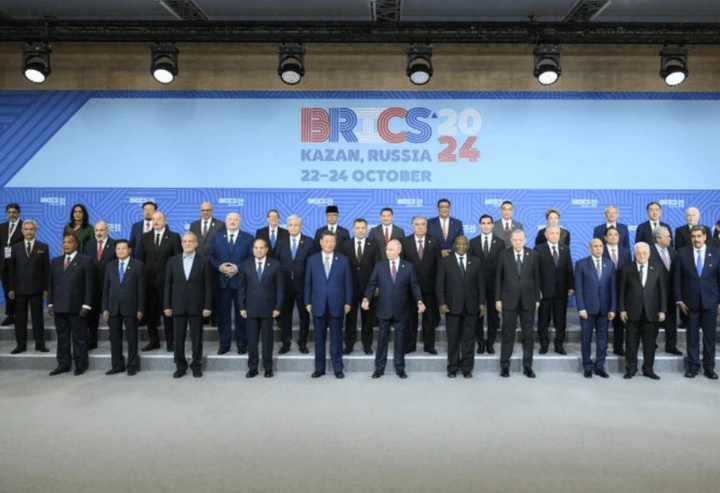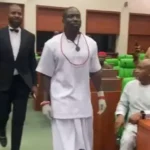There has been, for a long time, a rebellion against what some would call a Western-led world order and it birthed BRICS. World infrastructural systems run by the West, like the Society for Worldwide Interbank Financial Telecommunication (SWIFT SC), which is used by central banks of virtually every country for international payments, are some of the systems that have come under the purview of critics seeking a diversion of world order. ...READ THE FULL STORY FROM SOURCE ↔️
Military might like the North Atlantic Treaty Organisation (NATO), an intergovernmental military alliance of 32 member states, has been viewed by powerful non-members as a threat to their sovereignty.
Again, since the end of the Second World War, the US dollar has become the world’s most important currency, accounting for 89 per cent of all foreign exchange transactions.
BRICS (formerly BRIC until South Africa joined in 2011), a brainchild of Russia, a country led by President Vladimir Putin, widely known for his anti-West rhetoric, held its first ministerial meeting in 2006 on the sidelines of a UN General Assembly session in New York.
With the major goal of deepening economic cooperation between the member countries in contrast to the Western sphere of power, BRICS has continued to garner increased global attention.
Recently, at the BRICS summit in Kazan, Russia, held between October 22 to 24, 13 countries, including Nigeria, were announced as the organisation’s official partners. This is in addition to four new members.
What Does Nigeria Stand to Gain From BRICS?
The announcement that Nigeria has joined the economic bloc, though not as a member but as an ‘official partner,’ understandably caused a stir of mixed opinions among Nigerians.
“BRICS has become a very important organisation that we cannot overlook, and we can no longer continue to be neutral or claim that we are on the Western side because we are not a member of NATO or the G20,” Dr Robert Ekat, a political scientist, told Neusroom.
Accounting for 45 per cent of the global population and 30 per cent of the world’s land surface, BRICS’ five initial member states have a combined nominal GDP of $28 trillion, which accounts for 27 per cent of the gross world product.
Nigeria, Africa’s most populous country, has shown significant interest in joining BRICS for over two years.
“We need to belong to groups like BRICS, the G20, and others because if there’s a certain criterion—say, the largest countries in terms of population and economy should belong—then why isn’t Nigeria part of it?” Yusuf Tuggar, Minister of Foreign Affairs, said in November 2023.
Now, as an official partner, what does Nigeria stand to gain?
“One of the immediate gains is having alternative trading partners,” says Dr. Aram Nicholas Idris, head of the Division of International Relations at the Nigerian Institute of International Affairs (NIIA), in a recent interview.
Although Nigeria is still a non-member, the prospect of partnering with BRICS countries can create economic opportunities for the country, which has recently struggled with the high cost of living and the depreciation of the naira.
In recent years, there has been an increase in bilateral partnerships between several countries, particularly in the Global South, where African countries have severed ties with the US, a decision that has drastically diminished US influence on the continent.
Economically, several African countries have found more beneficial relations with China, which is increasingly replacing the US role by providing loans and grants. For instance, Nigeria-China trade volume reached $26 billion in 2023, compared to an estimated $10.6 billion between Nigeria and the US in 2022.
“Economically, Nigeria needs BRICS,” wrote Kalu Aja, a financial analyst, after the news of Nigeria joining as a partner was announced.
Masquerade Attacks in Nsukka: Enugu Govt Summons Traditional Rulers, Launches Investigation
However, the goal of BRICS includes a de-dollarization agenda by introducing other payment systems that will challenge or rival SWIFT.
“We are looking into the possibility of expanding the use of national currencies in settlements and want to establish tools that would make this safe and secure enough. BRICS will work out a payment arrangement with the cooperation of central banks affiliated with the group’s member countries,” Putin said at the recent BRICS summit.
The bloc has also considered creating its own currency, an idea that some experts have questioned.
“Any BRICS currency will hit dollar central bank reserve holdings in emerging nations. If Nigeria holds BRICS currency, it can simply import from Russia or the UAE, and that currency will be swapped and settled via a BRICS central bank,” Aja said in a tweet.
Yet the alignment of Nigeria with countries like Iran, Russia, and China has raised significant political concern about the erosion of some of Nigeria’s core democratic values, which, in most cases, seem misaligned with those of these countries.
While some argue that Russia and China are trying to reduce Western influence, with Nigeria potentially becoming a pawn in their quest, Dr. Robert Ekat maintained that BRICS is an economic bloc, “hence, the style of political governance is immaterial.” ..ALSO READ FULL FROM SOURCE ↔️




